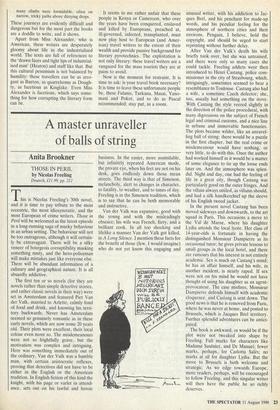A master unraveller of balls of string
Anita Brookner
THOSE IN PERIL by Nicolas Freeling
Deutsch, £11.99, pp. 212
This is Nicolas Freeling's 30th novel, and it is time to pay tribute to the most eccentric, the most idiosyncratic, and the most European of crime writers. Those in Peril will be welcomed as the latest episode in a long-running saga of murky behaviour in an urban setting. The behaviour will not be too outrageous, although it will certain- ly be extravagant. There will be a silky veneer of bourgeois corruptibility masking something nasty, and the hero-policeman will make mistakes just like everyone else. There will be abundant information of a culinary and geographical nature. It is all absurdly addictive.
The first ten or so novels (for they are novels rather than simple detective stories, and rather classic novels in their way) were set in Amsterdam and featured Piet Van der Valk, married to Arlette, calmly fond of food and drink, and knowing his terri- tory backwards. Never has Amsterdam seemed so genuinely romantic as in these early novels, which are now some 20 years old. Their plots were excellent, their local colour even more so. The misdemeanours were not so frightfully grave, but the motivation was complex and intriguing. Here was something immediately out of the ordinary. Van der Valk was a humble man, with certain aristocratic reflexes, proving that detectives did not have to be either in the English or the American tradition. In English fiction of this kind the knight, with his page or varlet in attend- ance, sets out on his lawful and heroic business. In the easier, more assimilable, but infinitely repeated American mode, the private eye, when his feet are not on his desk, goes endlessly down those mean streets. The third way is that of Simenon, melancholy, alert to changes in character, to fatality, to weather, and to times of day. Freeling is in the Simenon tradition, which is to say that he can be both memorable and instructive.
Van der Valk was expansive, good with the young and with the misleadingly obscure; his wife was French, fiery, and a brilliant cook. In all too shocking and lifelike a manner Van der Valk got killed, in A Long Silence. I mention these facts for the benefit of those (few, I would imagine) who do not yet know this engaging and
unusual writer, with his addiction to Jac- ques Brel, and his penchant for made-up words, and his peculiar feeling for the atmosphere of northern cities and their environs. Penguin, I believe, hold the copyright, and should be urged to start reprinting without further delay. .
After Van der Valk's death his wife briefly took over, but she was untrained, and there were only so many cases she could tackle. Freeling addicts were then introduced to Henri Castang, police com- missioner in the city of Strasbourg, which, intriguingly, sometimes seemed to bear a resemblance to Toulouse. Castang also had a wife, a sometime Czech defector; she, too, usually had something on the stove. With Castang the style veered slightly in the direction of the police procedural, with many digressions on the subject of French legal and criminal customs, and a nice line in urbane and immovable functionaries. The plots became wilder, like an unravel- ling ball of string: there would be a puzzle in the first chapter, but the real crime or misdemeanour would have nothing, or very little, to do with this. Once the author had worked himself in it would be a matter of some elegance to tie up the loose ends later on. And the atmosphere was splen- did. Night and day, one had the feeling of life in a great city, though Castang was particularly good on the outer fringes. And the villain always smiled, as villains should, and had a silk handkerchief up the sleeve of his English tweed jacket.
In the present novel Castang has been moved sideways and downwards, to the art squad in Paris. This occasions a move to the Val de Marne, where his daughter Lydia attends the local lycee. Her class of 14-year-olds is fortunate in having the distinguished Monsieur Dampierre as its occasional tutor; he gives private lessons to small groups in the local hotel, and there are rumours that his interest in not entirely academic. Sex is much on Castang's mind; he has an affair himself, and his wife, in another incident, is nearly raped. If sex were not on his mind he would not have thought of using his daughter as an agent- provocateur. The case misfires, Monsieur Dampierre defends himself with academic eloquence, and Castang is sent down. The good news is that he is removed from Paris, where he was never at home, and posted to Brussels, which is Jacques Brel territory. Further splendid adventures can be antici- pated.
The book is awkward, or would be if the plot were not tweaked into shape by Freeling. Full marks for characters like Madame Saulnier, and Dr Manuel; fewer marks, perhaps, for Carlotta Sales; no marks at all for daughter Lydia. But the move to Brussels is both welcome and strategic. As we edge towards Europe, more readers, perhaps, will be encouraged to follow Freeling, and this singular writer will then have the public he so richly deserves.










































 Previous page
Previous page